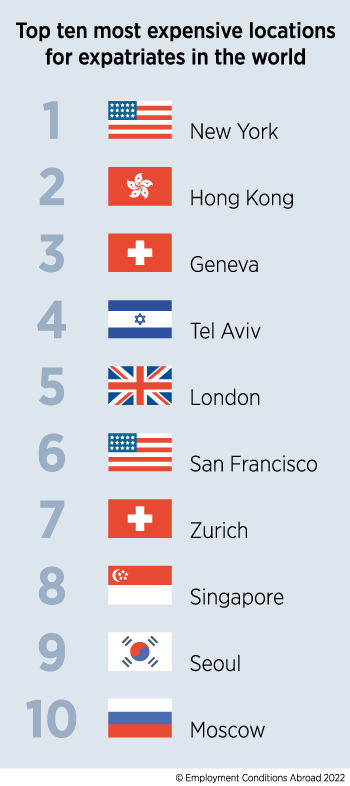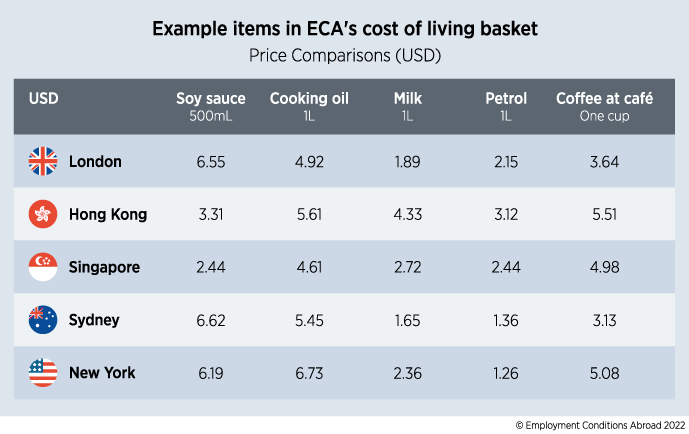• Hong Kong is the second most expensive location in the world for expatriates
• Singapore rose four places to become the eighth most expensive location in the world
• New York named the most expensive location in the world after falling out of global top three last year
Hong Kong has moved down one place and is now the second most expensive location in the world. New York edged ahead of Hong Kong as while both benefitted from a strong currency, the housing market in Hong Kong continues to face a weakening demand while rents in New York soared. This was one of the findings of the latest cost of living research published by ECA International, the world's leading provider of knowledge, information and software for the management and assignment of employees around the world.
“Like many places in the world, prices of day to day goods and services rose in Hong Kong at a rate well above those we have seen in recent years, and above the average rate of growth elsewhere in the Asia region,” said Lee Quane, Regional Director – Asia at ECA International, “However, demand for rental accommodation has weakened on account of Hong Kong’s ongoing sub-par economic performance, causing rents to fall and contributing to Hong Kong’s fall of one place in our ranking.”
ECA International has been conducting research into cost of living for 50 years. It carries out two main surveys per year to help companies calculate cost of living allowances so that their employees' spending power is protected while on an international assignment. The surveys compare a basket of like-for-like consumer goods and services commonly purchased by assignees in over 490 locations worldwide. ECA’s accommodation data is also factored in, comparing rental costs in areas typically inhabited by expatriate staff in over 420 locations worldwide.
Asia highlights
Although inflation is trending upward globally, it is not as high in Asia as in the rest of the world. Consequently, almost 65% of the surveyed locations in Asia have fallen in the global ranking. In China, a weaker yuan and relatively low rates of inflation have resulted in all surveyed cities in China dropping, with Guangzhou and Shanghai falling out of the global top 10 this year. Meanwhile, Taipei has moved down 11 places to 30th in global rankings as inflation remains lower than in many other cities.
“Low rates of inflation relative to other locations worldwide, alongside a weaker currency has made locations in mainland China relatively cheaper this year,” explains Quane. “Although prices have risen in Chinese cities meaning that living costs are higher in 2022 than they were in 2021, cities have nonetheless fallen in our rankings as prices have risen at a faster rate elsewhere.”
Singapore, however, has seen a significant rise in its ranking position. This has been due in part to relatively high rates of inflation in day-to-day goods and services in comparison to recent years. However, the main contributor to its rise of four places in the ranking has been significant increases in rental costs in 2022. As a result, Singapore’s global ranking moved up four places to eighth.
“The biggest driver of Singapore’s rise in our rankings has been a double-digit increase in rental costs in 2022,” said Quane. “The Covid-19 pandemic impacted the supply of accommodation coming to market and demand has increased significantly as the city has opened its borders once again. This may be a short-term shock but nonetheless, it has been responsible for Singapore’s current position as one of the ten most expensive locations worldwide.”
While Japan is usually seen as a country with relatively high cost of living, it is less the case this year. The Japanese yen has depreciated by 20% year-on-year against the US dollar, leading to big falls in the rankings for all Japanese cities surveyed. Tokyo, which ranked third globally last year, is out of the top 10 this year. Furthermore, Nagoya fell 49 places to 87th, just below Brussels and Rome.
In Sri Lanka, the ongoing economic crisis has pushed inflation up to more than 50% but despite this, a plunge in the value of the rupee caused its ranking to fall 29 places to 200th globally. The rupee plummeted 45% year-on-year against the US dollar, making the country much cheaper for visitors as the rapidly rising prices in local currency are actually cheaper compared to other locations. Karachi is Asia’s and the world’s cheapest city again this year as high rates of inflation have been offset by a weaker currency.
Global highlights
New York is named the most expensive location in the world. Thanks to the strength of the US currency and high inflation, all cities in the US have also moved up in rankings. San Francisco moved seven places up to sixth and Los Angeles entered global top 20.
In contrast, most locations in Europe have seen drops in the rankings. While high rates of inflation have been affecting many parts of the region driven by fuel and food costs, the euro has been weak, making the region cheaper in comparison to other cities around the world. In the United Kingdom, most cities also fell in the ranking thanks to the weak British pound, but London was an exception and rose one place to number 5.
“With the euro depreciating significantly to parity with the US dollar, all cities in the eurozone fell in the rankings despite high inflation fuelled by the war in Ukraine,” said Quane. “But the eurozone was not alone, many currencies weakened against the US dollar. Indeed, across Europe, only nine cities rose in the rankings, with London being one of them. However, the rise was in large part because of even greater weakness in Japan. While London has also been affected by the weak pound, high inflation including particularly large rent increases and the fact that Tokyo has seen even bigger drops in its currency, have led it to limp up one place in the ranking.”
With inflation well over 100% in Turkey, the country became more expensive for expats and tourists despite the plunging value of the lira. Istanbul rose 27 places to 150th and Ankara moved out of the last place to 205th in the ranking.
St Petersburg in Russia was the biggest riser in the rankings and Moscow moved in to the top 10 most expensive cities. Quane said, “Russian cities have shot up the rankings with St. Petersburg rising 101 places to 37th and Moscow’s up 42 places to 10th this year, thanks to high inflation fuelled by global sanctions combined with a rebound in the value of the rouble during the survey period.”
Top ten most expensive locations for expatriates - global
|
Location
|
2022 global ranking
|
2021 global ranking
|
|
New York
|
1
|
4
|
|
Hong Kong
|
2
|
1
|
|
Geneva
|
3
|
2
|
|
Tel Aviv
|
4
|
5
|
|
London
|
5
|
6
|
|
San Francisco
|
6
|
13
|
|
Zurich
|
7
|
7
|
|
Singapore
|
8
|
12
|
|
Seoul
|
9
|
8
|
|
Moscow
|
10
|
52
|
Top ten most expensive locations for expatriates - Asia
|
Location
|
2022 global ranking
|
2021 global ranking
|
|
Hong Kong
|
2
|
1
|
|
Singapore
|
8
|
12
|
|
Seoul
|
9
|
8
|
|
Shanghai
|
11
|
9
|
|
Tokyo
|
12
|
3
|
|
Guangzhou
|
15
|
10
|
|
Shenzhen
|
16
|
11
|
|
Beijing
|
17
|
15
|
|
Taipei
|
30
|
19
|
|
Yokohama
|
38
|
16
|

-ENDS-
Notes to Editors
About ECA's Cost of Living Ranking
ECA International's cost of living rankings combine ECA’s Cost of Living research and Accommodation research to enable a comparison of costs faced by expatriates around the world in 207 cities in 120 countries and territories.
This comparison of cost of living is calculated on a base composed of various developed countries and is used to reflect an international lifestyle. Other indices available from ECA reflect specific city-to-city comparisons and different levels of shopping efficiency.
ECA’s Cost of Living research
ECA International’s cost of living research is carried out in March and September using a basket of day-to-day goods and services commonly purchased by assignees. The data used above refers to the September 2022 data collection period with changes compared to the September 2021 period. ECA’s Cost of Living rankings began in 2005.
Cost of living indices are used by ECA clients to calculate cost of living allowances for assignees. The research covers:
- Food: Groceries; dairy produce; meat and fish; fresh fruit and vegetables
- Basic: Household goods; recreational goods; general services; leisure services
- General: Clothing; electrical goods; motoring; meals out; alcohol and tobacco
- Utilities costs
- Public transport
ECA’s Accommodation research
This ranking uses data from ECA's 2022 Accommodation reports. The reports have been published annually since 1996.
The reports provide comprehensive and reliable information for locations worldwide on the rental trends, types of accommodation and districts commonly sought by expatriates. To ensure impartiality and to maintain the accuracy of information, data from a number of sources is used to compile each accommodation report. ECA uses a global network of estate agents, relocation agents and extensive in-house research into worldwide property markets to establish and verify the housing data in the reports.
About ECA International
ECA International is the market-leading provider of knowledge, information and technology that enables businesses to manage their international reward programmes.
Partnering with thousands of clients on every continent, we provide a fully-integrated suite of quality data, specialist software, consultancy and training. Our unparalleled insights guide clients as they mobilise their most valuable resource: people.
We make the complex world of international mobility simple, providing clients with the expertise and support they need to make the right decisions - every time.
ECA International: Mobility solutions for a world that’s constantly moving.
For further information, please contact:
Tweety Chan
TEAM LEWIS
Tel: +852 3002 3761 ext 3766
Email: ecainternational@teamlewis.com
Cherie Cheung
TEAM LEWIS
Tel: +852 3002 3761
Email: ecainternational@teamlewis.com
Jenny Chiang
Email: Jenny.Chiang@eca-international.com